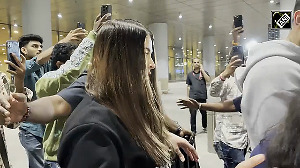'Sanction serves the salutary object of providing safeguard to the accused from unwarranted prosecution and the agony and trauma of trial, and in the context of the stringent provisions of the UAPA, is an integral facet of due process of law.'
If the report to the sanctioning officer for the first five accused in the case lacked the qualities required under the law, then for Professor Saibaba, the sanction came much after his trial had started!

Professor G N Saibaba, sentenced to life on charges of being a Maoist, was on Friday, October 14, 2022, discharged by the Nagpur bench of the Bombay high court, along with all his co-accused.
On Saturday, the Supreme Court will hold a special hearing to hear the Maharashtra government's appeal against the judgment.
The two-judge Bench of Justice Rohit Deo and Justice Anil Pansare held that the entire sessions court trial against the former Delhi University professor of English stood 'vitiated' for lack of sanction as mandated under the UAPA.
The rest of the accused, also sentenced to life, were also discharged because the judges held that the report on the evidence against them, sent by the director of prosecutions to the sanctioning authority, was 'blurred', and didn't fulfill the criteria required under the UAPA.
These accused are: Mahesh Tirki, Vijay Nan Tirki, Pandu Narote, Hem Mishra and Prashant Rahi.
Pandu Narote, a tribal youth, died in hospital in August.
All the accused were convicted in 2017 and have since been in the Nagpur Central Jail. Professor Saibaba, lodged in the jail's Anda Cell, is 90% handicapped and unable to move without a wheelchair.
Professor Saibaba's arrest was seen as a direct result of his open opposition to the then Chhattisgarh government's policy of Salwa Judum, and the Manmohan Singh government's Operation Green Hunt. Both resulted in the tribals of Bastar being driven out of their villages and herded into camps in the name of 'anti-Naxalite' measures, to enable corporates to mine the forests.
Over the last five years, Professor Saibaba was denied both bail and parole.
***
The 101-page judgment written by Justice Deo revolves around the concept of 'sanction' required under the provisions of the UAPA, without going into the merits of the sessions judge's order convicting the six accused.
Writes Justice Deo: 'Sanction is not a ritualistic formality...Sanction is a solemn and sacrosanct act which lifts the bar and empowers the Court to take cognizance of offence. Sanction serves the salutary object of providing safeguard to the accused from unwarranted prosecution and the agony and trauma of trial, and in the context of the stringent provisions of the UAPA, is an integral facet of due process of law.'
The judgment also examines the importance of provisions of sanction for prosecution under the two anti-terrorist laws that preceded UAPA -- TADA and POTA.
The order cites Supreme Court judgments which had struck down convictions under these two laws only because sanction as per the provisions of these laws had not been granted.
Finally, the order quotes excerpts from the speech made in 2009 by then home minister P Chidambaram in the Lok Sabha when he moved the Bill to amend UAPA, wherein he stressed that 'before you grant sanction, the evidence gathered must be reviewed by an independent authority.' This provision, said Chidambaram, was to be intended as a safeguard.
***
Professor Saibaba was arrested on May 9, 2014. The other five accused had already been arrested in August and September 2013. Professor Saibaba's name was added last, on 16.2.2014.
The sanction for prosecuting the first five accused was granted on 15.2.2014. Reproducing the report of the Director of Prosecution sent to the sanctioning authority, Justice Deo describes it as 'laconic' and 'blurred'.
'The purported report contains the conclusion sans reasoning. (He) did not have the benefit.. of the report of the CFSL of the digital data allegedly retrieved from the electronic gadgets. The report is bereft of the summary of the analysis of the evidence collected during the investigation, and axiomatically renders no assistance to the sanctioning authority...'
This was not the kind of report which the legislature had intended for the independent judicial officer to submit to the sanctioning authority, says the judgment, saying that 'It stands on the same footing as absence of report.'
'The legislative imperative is that the sanction for prosecution shall be given only after considering the report of the appointed authority which shall make an independent review of the evidence gathered ... we unhesitatingly hold that the sanctioning authority paid lip service to the legislative mandate and the report of the appointed authority was sought, and unfortunately given as a ritualistic formality. The transgression of the legislative imperative renders the sanction order dated 15-2-2014 bad in law.'
***
If the report to the sanctioning officer for the first five accused in the case lacked the qualities required under the law, then for Professor Saibaba, the sanction came much after his trial had started! His sanction came on 6.4.2015. By then the sessions judge had already examined one witness.
It is worth noting that when Professor Saibaba applied for bail, he pointed out this serious lapse. However, refusing him bail, the sessions judge said this issue would be addressed later.
The lack of sanction when the trial began completely vitiated the proceedings against Professor Saibaba, writes Justice Deo, at one point quoting the legendary British judge Lord Denning.
'If cognizance (of the charges) is taken without complying with the requirement of valid sanction, entire trial shall stand vitiated, and the conviction or acquittal recorded would not be by Court of competent jurisdiction,' says the judge.
The judgment goes on to say that given the UAPA's stringent provisions and the severe punishment that conviction under it entails, 'We are inclined to hold, that every safeguard, however miniscule, legislatively provided to the accused, must be zealously protected.'
In conclusion, the judgment says terrorism must be fought, but not at the cost of the law.
'Verily, terrorism poses an ominous threat to national security. Vile and abhorrent acts of terror do evoke collective societal anger and anguish. While the war against terror must be waged by the State with unwavering resolve, and every legitimate weapon in the armoury must be deployed in the fight against terror, a civil democratic society can ill afford sacrificing the procedural safeguards legislatively provided, and which is an integral facet of the due process of law, at the altar of perceived peril to national security.'
'The Siren Song that the end justifies the means, and that the procedural safeguards are subservient to the overwhelming need to ensure that the accused is prosecuted and punished, must be muzzled by the voice of Rule of Law.'
'Any aberration shall only be counter productive, since empirical evidence suggests that departure from the due process of law fosters an ecosystem in which terrorism burgeons and provides fodder to vested interests whose singular agenda is to propagate false narratives.'
***
Though the judgment does not go into the merits of the order convicting Saibaba and his co-accused, Justice Deo does point to one statement made by the sessions judge: 'imprisonment for life is not a sufficient punishment to accused 6- G.N. Saibaba and the hands of the Court are tied in view of the fact that the imprisonment for life is the maximum punishment statutorily provided.'
Says Justice Deo: 'We do not approve of the unwarranted observations of the learned Sessions Judge, which may have the unintended consequence of rendering the verdict vulnerable to the charge of lack of dispassionate objectivity.'
Lawyers for Professor Saibaba were Senior Counsel S P Dharmadhikari and Advocate Nihal Singh Rathod. Advocate Harshal Lingayat and others appeared for Pandu Narote. The rest were represented by a team headed by Advocate Pradeep Mandhyan.
Reacting to the judgment, Advocate Mandhyan said the accused may well be advised to appeal against the judgment since it has "discharged", not acquitted the accused.
"A sanction bad in law under UAPA is an incurable infirmity under the relavant provisions of the CrPc... It's as if there is no trial, and tantamount to dismissal, which is again tantamount to acquittal," Advocate Mandhyan said.
"Without mandatory sanction, no court can take cognisance of the accusations made by the State against the accused."











 © 2025 Rediff.com -
© 2025 Rediff.com -